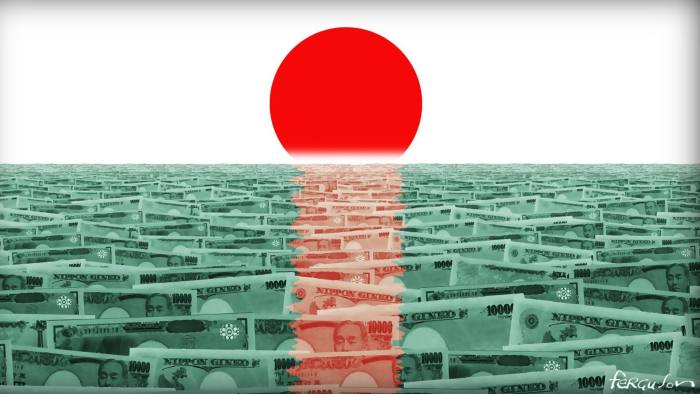(单词翻译:单击)
One quadrillion yen. ¥1,000,000,000,000,000. Two hundred and thirty nine per cent of gross domestic product. Simply to state the epic size of Japan’s public debt invokes a frisson of disaster foretold and virtuous warning duly given. A debt so large must surely end in financial catastrophe. Just look at Greece. Argument over. Do something and do it now, you deadbeats.
1000万亿日元,国内生产总值(GDP)的239%。仅仅说出日本公共债务的可怕规模,就会让人因为预感到灾难而不寒而栗,并好心给出善意的警告。如此庞大的债务肯定会以金融灾难告终。看看希腊吧。争论到此为止。做点什么吧,现在就做,你们这些老赖。
Debt paralyses economic debate in Japan, suppressing political differences over tax or spend, and hanging over all efforts to stimulate the economy. Yet despite two decades of warnings about fiscal Armageddon, a debt crisis never arrived. It never even came close, despite shocks on the scale of Lehman Brothers and the Tohoku earthquake. Traders have a name for the bet against Japanese government bonds: “the widow-maker”.
债务让日本的经济辩论陷入停滞,压制了政治上关于税收或支出的分歧,搁置了所有刺激经济的努力。然而尽管20年来对“财政末日”的警告不绝于耳,但债务危机从未爆发。甚至日本从没有接近爆发债务危机,尽管雷曼兄弟(Lehman Brothers)和日本东北部地震带来那么大的冲击。交易员为做空日本政府债券起了个名字:“寡妇制造者”。
Financial morality tales usually end with a purifying crisis, to cleanse the vice of debt. But it is time to accept that such a crisis may never happen. So far, Japan has provided smoothly for the world’s fastest-ageing population. It is the inchoate and incoherent fears of a debt disaster that have led to serious policy mistakes, such as the 2014 rise in consumption tax that choked off economic recovery.
金融伦理剧往往以一场清理债务之恶的净化性危机结束。但现在是时候接受此类危机可能永远不会爆发的观点了。迄今为止,日本顺利地供养了全球老龄化最快的人口。正是由于对债务危机过早且缺乏逻辑的担忧,才导致了重大的政策错误,比如2014年提高消费税税率扼杀了经济复苏。
There are only four ways a country can resolve a large public debt: growth, repayment, default or inflation. Growth is out. Whatever prime minister Shinzo Abe says, Japan cannot outgrow its liabilities while the population shrinks, no matter how many trade deals it signs or reforms it concludes. Large-scale immigration would change everything, but debt ratios should not decide so fundamental a social choice.
一个国家只有4种解决巨额公共债务的方法:增长、偿还、违约或者通胀。增长没戏。不管日本首相安倍晋三(Shinzo Abe)说什么,日本经济增速都不可能在人口缩减的同时超过其债务增速,无论它签署多少贸易协定或者完成多少改革。大规模移民将会改变一切,但债务比率不应该决定如此重大的社会选择。
Repayment is almost as difficult. It would require a budget surplus over many years despite ever greater spending on healthcare, pensions and national defence. In turn, a surplus requires a corresponding deficit for consumers, companies or foreigners. Given the expectation of higher taxes and uncertain pension provision, Japanese households seem unlikely to run down their savings aggressively.
偿还几乎同样困难。它将需要多年预算盈余,即使在医疗、养老保险和国防上的支出日益增长。预算盈余进而需要消费者、公司或者外国人的相应赤字。鉴于增税预期和养老保险提供的不确定预期,日本家庭似乎不太可能大幅降低储蓄。
That makes the two crisis outcomes — default or inflation — seem inevitable. Default, however, makes no sense at all since almost all of Japan’s debt is owned by the central bank and the domestic financial system. If it did not repay, the government would simply have to recapitalise them. It would be defaulting on itself.
这让两个危机后果似乎不可避免——违约或者通胀。然而,违约一点儿也不明智,因为日本几乎所有的债务都由央行和国内金融体系持有。如果不偿还债务,日本政府将不得不进行债务重组。那将是自己对自己违约。
Higher inflation — at or a bit above the 2 per cent inflation target Japan has missed for the past couple of decades — would help, not hurt, by gently eroding debt. Just possibly, in the transition to higher inflation, the Bank of Japan might lose control and let prices take off. But the government has little incentive to pursue an inflation tax. Japan is an asset-owning country full of price-conscious pensioners. There is no quicker route to political suicide than destroying their savings.
通胀上升——达到或略超过日本在过去20年一直未能实现的2%通胀目标——将会有利而非有害于债务问题,因为会让债务轻微贬值。有可能,在通胀上升的过程中,日本央行(BoJ)会失去控制,从而导致物价飙升。但日本政府没有什么动力追求通胀税。日本是一个持有资产的国家,尽是对价格在意的养老金领取者。没有比破坏他们的储蓄更迅速的政治自杀路线了。
All four routes to resolving the public debt seem improbable. Nor is there any obvious reason, given that Japan is the world’s biggest international creditor, why investor panic and flight from the yen should force it to choose among them.
这4个解决公共债务的方法似乎都不可行。鉴于日本是世界上最大的国际债权国,面对投资者的恐慌和抛售日元,日本也没有明显的理由必须在这4个方法当中选择。
That leaves a more plausible fifth option. Do not resolve the public debt. Live with it. This is surprisingly do-able.
这就只剩下更可行的第五个选项。不去解决公共债务问题,适应它。这令人意外地行得通。
In a forthcoming update to a prescient 2005 paper casting doubt on the likelihood of a debt crisis, Columbia University economist David Weinstein and co-author Mark Greenan find three reasons why Japan has avoided a bond panic: falling interest costs, ruthless control of spending on the elderly and a big rise in taxes.
2005年,哥伦比亚大学(Columbia University)经济学家大卫?韦恩斯坦(David Weinstein)和马克?格林南(Mark Greenan)合作撰写了一篇具有预见性的报告,对日本爆发债务危机的可能性表示了怀疑。他们在即将发表的最新版报告中发现了日本得以避免债务恐慌的三个理由:利息成本下降、严格控制对老年人的支出以及大幅增税。
The real interest rate Japan pays on its debt has fallen steadily. With short-term interest rates now negative, the country gets paid to borrow for short periods. The interest bill is even more manageable after factoring in revenues from Japan’s foreign exchange reserves and other public financial assets. As a result, economic stimulus under Mr Abe has finally stabilised Japan’s debt after years of relentless increase. It was 237 per cent of GDP in 2012. The International Monetary Fund forecasts 232 per cent of GDP for 2022.
日本为其债务支付的实际利率逐步下降。随着现在短期利率成为负值,日本短期借款还能获得报酬。在考虑到日本外汇储备和其他公共金融资产的收入之后,利息费用甚至更可控。因此,在债务多年急剧增长之后,安倍晋三推出的经济刺激计划最终让日本债务企稳。2012年日本债务是GDP的237%,国际货币基金组织(IMF)预计2022年该比率为232%。
Low interest rates mean the existing debt simply does not matter that much for fiscal sustainability. More importantly, and belying its reputation for wasteful public works, Japan has made a series of tough decisions on healthcare and pension spending. Real per capita outlays on the elderly have fallen. Tax revenues are up by six percentage points of GDP since 2000. “If this approach continues,” write Mr Weinstein and Mr Greenan, “Japan may very well avoid either a financial crisis or a major inflationary episode.”
低利率意味着现有债务对于财政可持续性不那么重要。更重要的是,尽管有着公共工程浪费的名声,但日本在医疗和养老金支出方面做了一系列艰难的决定。对老年人的实际人均支出下降。税收收入与GDP之比自2000年以来上升了6个百分点。韦恩斯坦和格林南写道:“如果这种做法持续,日本很可能既不会爆发金融危机,也不会出现严重通胀。”

Japan cannot afford to splurge. As the baby boom generation reaches old age, it will need to means test benefits and raise more revenue from wealth and consumption taxes. But Japan has shown it can do so. It is time, therefore, to drop the fears of imminent crisis and the demands for instant fiscal tightening. Mr Abe’s policies have stabilised Japan’s debt. It is imperative to keep them going until inflation is high enough to cut interest rates during a recession and the economy is strong enough to run a fiscal surplus during a boom.
日本承担不起挥霍的代价。随着婴儿潮出生的一代人变老,日本将需要调查福利状况,并增加财富税和消费税收入。但日本已经表明自己可以做到这些。因此现在是时候抛掉很快爆发危机的担忧,以及立即实施财政紧缩的要求。安倍晋三的政策稳定了日本的债务。必须保持这种政策直至通胀高到能够在经济低迷期间降息,以及经济强劲到在繁荣期间出现财政盈余。
A country with Japan’s demographics will always be close to the edge. With discipline on spending, however, there is no reason to fall off it. The widow-maker has plenty more victims in it yet.
一个拥有日本这样人口结构的国家将总是处在债务悬崖边缘。然而,随着加强支出纪律,它没有理由跌落悬崖。寡妇制造者还会制造更多的受害者。


